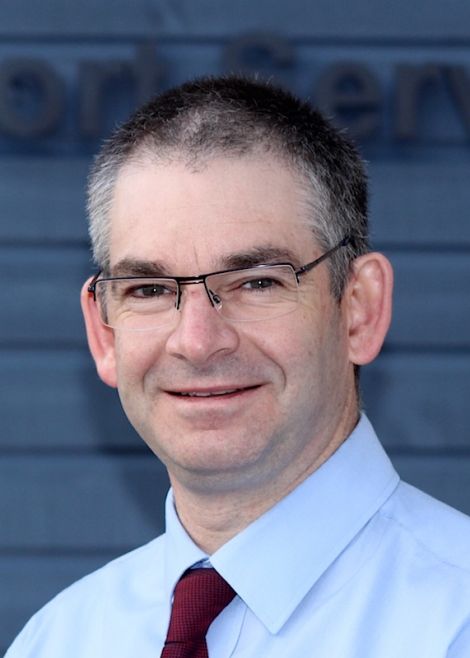News / Calls for BT to provide assurances over blackout
NHS SHETLAND, Sumburgh Airport operator HIAL and the Scottish Government have all sought reassurances from BT that contingency plans will be put in place to avoid a repeat of Saturday’s communications blackout.
The disruption saw many phone lines and radio connections down for around five hours, leaving people in the isles unable to dial 999 and resulting in the closure of Sumburgh Airport and the cancellation of 11 flights.
Having immediately launched an investigation, BT has now issued a further statement outlining that the network serving the Northern Isles was designed to “provide back-up for most services in most scenarios”.
Two blown rectifiers at BT’s Wideford Hill transmitter station in Orkney caused the fault. The company said it was possible the equipment had been damaged as a result of previous lightning strikes.
The Wideford Hill station is one of the sites that routes traffic over separate radio and subsea cable routes “to provide resilience and protection against long-duration outages”.
A BT spokeswoman said: “However, following the damage to the power rectifiers and fuses, some traffic was found to be relying on Wideford for both the main and back-up paths.
“We are investigating why this happened and working on reconfiguring the network to prevent any repeat. It is possible that damage may have been caused by previous lightning strikes locally damaging our equipment, but we cannot confirm that at this stage.
She added: “We’re sorry for the disruption caused on Saturday.”
After the phone and radar systems were knocked out, HIAL said it resulted in the air traffic system being unable to process arriving and departing planes – meaning Sumburgh had to shut on Saturday lunchtime.
A HIAL spokesman said the decision to cancel flights was “not taken lightly” and extra flights were laid on the following day. The airport stayed open late on Sunday to clear the backlog of flights, for which it was grateful to airport staff.
Become a member of Shetland News
“In these circumstances, the procedure is that airlines take the lead in communicating schedule changes to individual passengers.
“However, we apologise if passengers feel we could have done more to communicate with them.”
The spokesman added: “We will be contacting BT to seek assurances that in the event of a similar systems failure, they have contingency plans in place to ensure continuity of service.”
Loganair said seven extra services were scheduled on Sunday to deal with the backlog of passengers, which carried 195 passengers.
A total of 50 passengers opted to take the overnight ferry, and a further 52 passengers were given overnight accommodation, while refreshment vouchers were also given out to those whose travel plans were disrupted.
The blackout also caused a major headache for NHS Shetland – leaving patients unable to dial 999 for several hours.
The heath board said it was grateful to staff who “ensured that services continued to operate despite the communication disruption”.
Its bleep system remained operational to allow contact with key staff within Shetland, while it was also able to contact the Scottish mainland through its Highland Hub.
Clinical services director Simon Bokor-Ingram said: “My understanding is that people were not able to dial 999 if they needed the emergency services. We had some incoming calls into the hospital, but we weren’t able to dial out on the usual switchboard numbers.”
Bokor-Ingram added that the health board had a BT account manager and would be “asking for assurances” as to “how they’re going to deal with whatever actions they need to take”.
“Once we know what went wrong then obviously we can have a conversation about what actions they’re planning. We have a dedicated account manager we can talk to – so we will be approaching BT.”
Shetland MSP Tavish Scott has called on transport and islands minister Derek Mackay to accept the Scottish Government’s responsibilities, “ask BT what went wrong and get it sorted immediately”.
Scott said there would have been “an outcry” if there had been a similar blackout in the central belt.
“Can you imagine the hoo-hah if Glasgow had lost its emergency service phone number for hours?
“It would have led every TV bulletin and been all over the national press. Because it happens away up in Shetland no one seems to pay any attention at all.”
Shetland News has asked for an interview with a Scottish Government minister following this weekend’s disruption.
A statement issued by the government said emergency service control centres “were not impacted as a result of the telecommunications outage in Orkney and Shetland on Saturday 24 July – it was the ability of the public to make 999 calls in the areas affected”.
The government said BT had assured it that “established notification protocols for the loss of the 999 service were followed and that they are investigating the cause … to ensure it doesn’t happen again”.
A spokeswoman added: “A wider piece of work is already underway between the Scottish Government, service providers and the Highlands & Islands Local Resilience Partnership to review the impact of a loss of telecommunications service within remote and rural areas of Scotland to consider where improvements can be made to both physical and procedural arrangements.”
Become a member of Shetland News
Shetland News is asking its many readers to consider paying for membership to get additional features and services: -
- Remove non-local ads;
- Bookmark posts to read later;
- Exclusive curated weekly newsletter;
- Hide membership messages;
- Comments open for discussion.
If you appreciate what we do and feel strongly about impartial local journalism, then please become a member of Shetland News by either making a single payment, or setting up a monthly, quarterly or yearly subscription.






























































